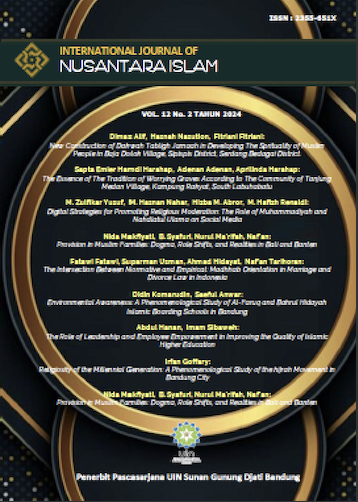Implementation of Strategic Management in Islamic Boarding Schools: Analysis of Constraints and Solutions for Improving Education Quality
Main Article Content
Abstract
One of the factors that play an important role in improving the quality of education isstrategic management. The purpose of this research is to find out, examine, analyse, and understand in depth about the implementation of management functions in Islamic boarding schools, factors inhibiting the implementation of management functions in Islamic boarding schools; and solutions to obstacles to the implementation of management functions in realising the goals of Islamic boarding schools Nurul Huda and At-Thaariq Garut. The method in this study uses a qualitative approach with a descriptive-holistic method and case study analysis that seeks to analyse the use of supporting tools for management practices. Based on the research results, Pondok Pesantren Nurul Huda and Pondok Pesantren At-Thaariq Garut have implemented strategic management which includes planning, directing, supervising, and evaluating, involving all divisions to achieve educational goals. However, obstacles such as lack of synergy, discipline, understanding of tasks, and conflict of orders between leaders still hinder the optimal implementation of strategies. In conclusion, to achieve better results, pesantren need to improve the analysis of HR needs, strengthen the discipline system, and conduct consistent evaluations. A collaborative and holistic approach in strategic management will help pesantren achieve their vision, mission, and expected education quality.
Article Details
The Authors submitting a manuscript do so on the understanding that if accepted for publication, copyright of the article shall be assigned to International Journal of Nusantara Islam, Sunan Gunung Djati State Islamic University.
The copyright encompasses exclusive rights to reproduce and disseminate articles in all forms and media, including reprints, photographs, microfilm, and similar reproductions, as well as translations. Some or all of the contents of this journal can be stored in databases and transmitted in any form and media without the need for written permission from the International Journal of Nusantara Islam, Sunan Gunung Djati State Islamic University.
The Editors and the Advisory International Editorial Board make every effort to ensure that no wrong or misleading data, opinions or statements be published in the journal. In any way, the contents of the articles and advertisements published in the International Journal of Nusantara Islam (IJNI) are sole and exclusive responsibility of their respective authors and advertisers.
References
Anwar, S., & Rosyad, R. (2021). Thought and Application of Environmental Theology in Pesantren Cicalengka, Bandung Regency. Journal of Faith and Spirituality, 1(2). https://doi.org/10.15575/jis.v1i2.11793
Azyumardi Azra. (1999). Islamic Education: Tradition and Modernisation Towards the Millennium. Yogyakarta: Student Library.
Bruinessen, M. Van. (1999). The Yellow Book: Pesantren and Tarekat. Bandung: Mizan.
Bubalo, A., & Fealy, G. (2007). The caravan trail: the influence of middle-eastern radicalism in Indonesia. Mizan Library.
Creswell, J. W. (2014). Research Design: Qualitative, Quantitative and Mixed Methods Approaches. New York: SAGE Publications, Inc.
Dasrimin, H., Imron, A., & Supriyanto, A. (2019). Spirituality-Based Character Education Strategic Management. In Journal of Humanities Education (Vol. 7).
Daulay, H. P. (2001). Historicity and Existence of Pesantren, Pesantren and Madrasah. Yogyakarta: Tiara Wacana.
David, F. R., & David, F. R. (2016). Strategic Management: A Competitive Advantage Approach. Jakarta: Salemba Empat.
Dhofier, Z. (1994). Pesantren Tradition: A Study of the Kiai's View of Life. Jakarta: LP3ES.
Fachrudin, Y. (2021). Strategies for Improving the Quality of Islamic Boarding Schools. Dirasah: Journal of Islamic Thought and Basic Education, 4(2), 91-108.
Flick, U. (2009). An Introduction to Qualitative Research. London: Sage Publishing.
Hasan, N. (2022). Salafism, Education, and Youth. Wahhabism and the World: Understanding Saudi Arabia's Global Influence on Islam, 135.
Hefner, R. W., & Zaman, M. Q. (2010). Schooling Islam: The culture and politics of modern Muslim education. Princeton University Press.
Hunger, J. D., & Wheelen, T. L. (2003). Strategic Management. Yogyakarta: Andi.
I. Suryatini, E. Mulyasa, S. Yusuf, Y. I. (2019). Quality Management of Islamic Education Learning. Education Management Studies, 2(2), 141-150.
Ishaq, M. (2018). KH. Abdul Wahid Zaini and the Development of Nurul Jadid Islamic Boarding School Paiton Probolinggo.". Postgraduate Thesis, Sunan Ampel State Islamic University Surabaya.
Kaplan, L. S., & Owings, W. A. (2015). Introduction to the principalship: Theory to practice. In Introduction to the Principalship: Theory to Practice. https://doi.org/10.4324/9781315814964
Koontz, H., & O'Donnell, C. (1970). Principles of Management: An Analysis of Managerial Functions. New York: McGraw-Hill.
Kuntoro, A. T. (2019). Islamic education quality management. Journal of Education, 7(1), 84-97.
Masruri, M., Ali, H., & Rosadi, K. I. (2021). Financial Management in Maintaining the Quality of Islamic Boarding Schools During the Covid-19 Pandemic. Journal of Applied Management Science, 2(5), 644-657.
Mubarok, R. (2019). Implementation of Management Functions in Improving the Quality of Islamic Education Institutions. Al-Rabwah, 13(01), 27-44.
Prasodjo, S., Zamroni, M., Mastuhu, M., Goenari, S., Madjid, N., & Rahardjo, M. D. (1975). Pesantren Profile. Jakarta: LP3ES.
Sallis, E. (2002). Total Quality Management in Education. London: Kogan Page.
Suherman, U., & Cipta, E. S. (2024). Application of Management Functions in Improving the Quality of Islamic Boarding Schools. SPECTRA: Journal of Islamic Religious Education, 1(1), 40-60.
Terry, G. R. (2006). Principles of Management. Bandung: Alumni.
Vincent, G. (2001). Total Quality Management. Jakarta: Gramedia.
Wahid, A. (1999). Bunga Rampai Pesantren. Jakarta: Dharma Bhakti.

